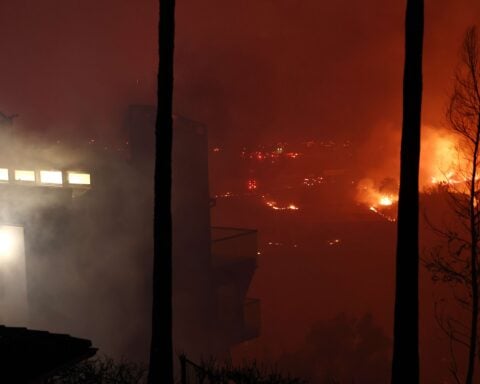Five Beverly Vista Middle School students have been expelled for creating and sharing explicit AI-generated images of their classmates. During a special meeting on March 6, the Beverly Hills Unified School District (BHUSD) decided on the expulsions, but California Education Code restricted the details shared.
While specifics are limited due to student privacy regulations, according to the LA Weekly, reports indicate the disturbing practice involved digitally superimposing eighth-graders' faces onto AI-generated nude bodies, a technique known as "deepfakes." Shockingly, a total of 16 students were victimized by these manipulated images, which were swiftly destroyed within 24 hours of school officials uncovering them. The identities of the expelled students have been kept private.
While the district has not yet faced legal objections to the expulsions, the Beverly Hills Police Department continue to investigate whether criminal charges should be filed, even though no arrests have been made.
In a joint statement, the principal and superintendent strongly denounced the behavior, describing it as reprehensible and against community values. "We want to make it unequivocally clear that this behavior is unacceptable and does not reflect the values of our community" per the platform. "This behavior rises to a level that requires the entire community to work in partnership to ensure it stops immediately.."
The incident has ignited a broader national conversation around the ethical implications of AI technology and its potential for exploitation. Superintendent Bregy acknowledged this: "We understand kids make mistakes as they learn and grow, but accountability is essential, and appropriate measures were taken."
While AI revolutionizes industries and shows vast potential in fields like healthcare, its misuse for nefarious ends like non-consensual explicit content raises grave concerns. The increasing accessibility of highly realistic deepfakes threatens personal privacy and dignity. Experts caution this tech could be weaponized for revenge porn, identity theft, or even political disinformation.
Unfortunately, Beverly Hills is not an isolated case. In November 2022, a New Jersey high schooler allegedly created and shared AI-generated nudes of a classmate via Snapchat. Likewise, the misuse of AI deepfakes for explicit celeb images, like those of Taylor Swift shared on X (formerly Twitter) without consent, sparked outrage.
These incidents underscore the urgent need for comprehensive legislation and educational initiatives to address AI technology's ethical and legal ramifications, particularly when used to create explicit content without consent. While California lawmakers have proposed legislation addressing AI porn, nude images, and child exploitation, Governor Newsom has yet to sign any into law.
"The misuse of AI for non-consensual explicit content demands urgent action from lawmakers, educators, and tech firms," stated Jessie Rossman of the AI Ethics Institute. "Incidents involving minors are especially egregious, necessitating robust age verification and harsh penalties for exploiting this powerful tech as predators."
In response, the district vows to enforce the strictest disciplinary actions permitted for any student creating, sharing, or possessing AI-generated explicit imagery. "We are collectively outraged and prepared to impose the harshest disciplinary consequences allowed," the joint statement asserts.
This incident has sparked calls for comprehensive AI education and ethics awareness campaigns, especially for youth. Experts argue curricula must cover not just AI's technical aspects but also its societal impacts and misuse risks.
"AI literacy is crucial for modern education, equipping students to navigate this rapidly evolving landscape responsibly," said Dr. Tara Jones, Digital Ethics Professor at Stanford. "Fostering early understanding of AI's capabilities, limitations and ethics empowers youth to harness its potential for good while mitigating harms."
As Beverly Hills grapples with this disturbing fallout, the urgency for proactive measures to ensure ethical AI development intensifies. It underscores how unchecked AI misuse can devastate vulnerable groups like minors despite the tech's vast promise.

 US FDA proposes standardized testing to detect asbestos in talc products
US FDA proposes standardized testing to detect asbestos in talc products
 'They're children': Witness tries saving two teens in Milwaukee Christmas shooting
'They're children': Witness tries saving two teens in Milwaukee Christmas shooting
 4 adults found dead of apparent carbon monoxide poisoning in New Hampshire home, officials say
4 adults found dead of apparent carbon monoxide poisoning in New Hampshire home, officials say
 Israel strikes Houthi targets in Yemen, killing three
Israel strikes Houthi targets in Yemen, killing three
 Ukraine's military intelligence says North Korean troops suffer heavy battlefield losses
Ukraine's military intelligence says North Korean troops suffer heavy battlefield losses
 The bird at the center of the worst single-species mortality event in modern history isn’t recovering, scientists say
The bird at the center of the worst single-species mortality event in modern history isn’t recovering, scientists say
 China's CATL to seek Hong Kong listing
China's CATL to seek Hong Kong listing
 Holiday shoppers increased spending by 3.8% despite higher prices
Holiday shoppers increased spending by 3.8% despite higher prices
 Inmates help spread Christmas spirit at Oklahoma correctional centers
Inmates help spread Christmas spirit at Oklahoma correctional centers
 Treasure Coast postal carrier makes Christmas wishes come true
Treasure Coast postal carrier makes Christmas wishes come true
 'They brought happiness and Christmas cheer': Birmingham Bowl players visit VA Hospital on Christmas
'They brought happiness and Christmas cheer': Birmingham Bowl players visit VA Hospital on Christmas








